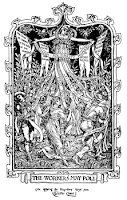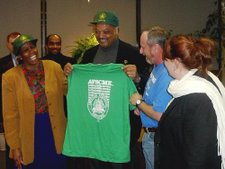
Please, Sen. Blanche Lincoln, change your mind on the Employee Free Choice Act.
Earlier this month, Lincoln announced that she would oppose the Employee Free Choice Act, an AFL-CIO-supported initiative that would simplify the process by which the National Labor Relations Board would certify unions as the collective bargaining agents for workers. Rather than holding costly, complicated and often drawn-out elections, the NLRB would certify a union when more than 50 percent of the employees sign union cards - a method commonly called "card check."
The best way to help Arkansans in these troubled economic times is to put more money in the pockets of those who go to work every day, and making it easier for people to join labor unions would do just that. In 2006 and 2007, unionized workers in the state - there are about 80,000 of them - averaged $17.29 per hour, and non-union workers made but $12.70 an hour. In other words, union workers made 36 percent more than non-union workers. Even within the same job categories, unionized workers make more.
In Little Rock, workers at Kroger grocery stores earn about 25 percent more than their counterparts at Wal-Mart. This is because the union that represents Kroger workers - the United Food and Commercial Workers - sees to it not only that its members receive a living wage but also that they cannot be fired for simply having accrued too many seniority raises or reaching an age that causes insurance rates to rise.
Since consumer spending represents about two-thirds of our nation's economic activity, making it easier for workers to join unions would also create more jobs - the very thing that Lincoln says is her top priority. With more money in their pockets, union families would spend more on food, clothing, computers and books, and this increased demand for goods would stimulate the economic growth needed to get the nation back on a sound economic footing.
Recent surveys suggest that more than half of American workers would join unions if given the opportunity. But currently about 12 percent of the nation's workers are union members. The major reason for this disparity is simple: the process by which the National Labor Relations Board certifies unions provides too many opportunities for companies to coerce those seeking to join unions. Elections to certify unions are held on company premises. Employers threaten their employees that they will lose their jobs if the union is certified. Legal challenges drag out the process in hopes that employees will give up in their attempt to organize, and workers are often forced to sit through sessions designed to intimidate them. This is the process that the Employee Free Choice Act seeks to simplify.
The opponents of the Employee Free Choice Act - among the most strident are Wal-Mart, The Home Depot and bailout poster child Bank of America - have been disingenuous in their opposition. Instead of telling people the real reason that they oppose card check - they don't want to pay their employees higher wages and they want to be able to fire workers without due process - these companies have hid behind claims of wanting to preserve the "secret ballot."
Arkansans should remember, though, that the secret ballot does not guarantee free or fair elections. For political elections, the state introduced the secret ballot (also called the Australian ballot) in 1892 specifically to stop blacks and poor whites from voting. A Democratic campaign song that year explained:
The Australian ballot works like a charm,
It makes them think and scratch,
And when a Negro gets a ballot
He has certainly met his match.
As Harvard University historian Jill Lepore has written, "The year after Arkansas passed its Australian-ballot law, the percentage of black men who managed to vote dropped from 71 to 38." The total white vote declined by more than 25 percent, with the poor making up most of those disenfranchised. In other words, history makes clear that the secret ballot can be used to some very undemocratic ends.
A strong labor movement is good not only for union members but for all Arkansans. Over the course of the 20th century, the Arkansas labor movement was at the forefront of nearly every positive reform in the state, reforms that were denounced as "too radical" by the economic elite at the time but are now taken for granted. In the century's first two decades, the Arkansas State Federation of Labor helped push through direct legislation, child labor laws, educational reforms, women's suffrage, maximumhours laws and minimum-wage legislation. In the 1930s, it was the architect of the state's workers' compensation and unemployment plans. In the postwar years, it led the way in integrating public facilities, increasing aid for education, fighting for the repeal of the poll tax and opposing the doctrines of nullification and interposition that the segregationists wanted to use to keep African-Americans second-class citizens.
A vibrant labor movement is Arkansas' best hope for a progressive future.
· · ·
Dr. Michael Pierce is an assistant professor of history at the University of Arkansas at Fayetteville, where he teaches Arkansas history and serves as associate editor of the Arkansas Historical Quarterly. He is a member of AFSCME Local 965.
This entry originally appeared in the Benton County Daily Record, May 10, 2009.










